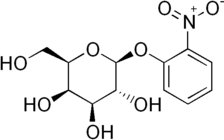Galactoside
A galactoside is a glycoside containing galactose. The H of the OH group on carbon-1 of galactose is replaced by an organic moiety.[1]

Depending on whether the glycosidic bond lies "above" or "below" the plane of the galactose molecule, galactosides are classified as α-galactosides or β-galactosides.
A β-galactoside is a type of galactoside in which the glycosidic bond lies above the plane of the galactose residue. The most commonly recognized and used β-galactoside in biochemistry is lactose.[citation needed] However, other chemicals, such as ONPG, are known, but these are typically synthesized for biochemical assays.
Galactosides play significant roles in metabolic processes of many organisms and are hydrolyzed by a class of enzymes called galactosidases and are classified according to what type of glycosidic linkage on the galactoside they will break.[2] For example, enzymes that hydrolyze the β-galactoside glycosidic bond are called β-galactosidases, while those that hydrolyze the α-galactoside glycosidic bond are known as α-galactosidases.[2]
References
[edit]- ^ Mosby (29 April 2016). Mosby's Medical Dictionary - E-Book. ISBN 9780323414265.
- ^ a b Huber, R. E. (2001-01-01), Brenner, Sydney; Miller, Jefferey H. (eds.), "Beta (β)-Galactosidase", Encyclopedia of Genetics, New York: Academic Press, pp. 212–214, ISBN 978-0-12-227080-2, retrieved 2022-05-12
